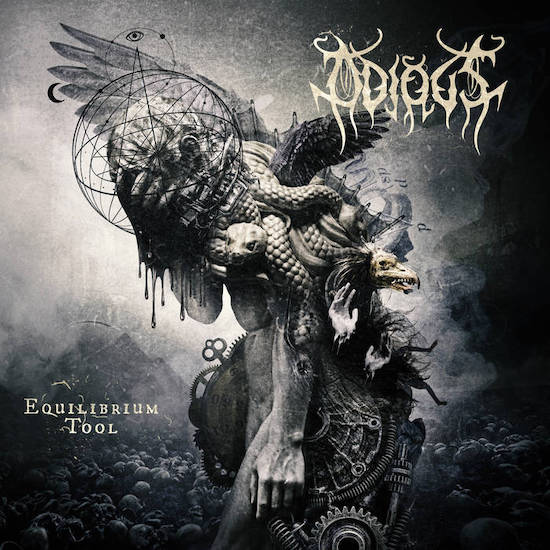
(We present NCS contributor Didrik Mešiček‘s review of the first album in nine years from the Egyptian metal band Odious, which was released earlier this month.)
Have you ever thought about how much of the metal you listen to actually comes from about five, or at most ten, countries? And while those countries are great at producing some quality bands, it’s a shame massive parts of the world have a poorly developed metal scene, and a lot of those nations have unique takes on music as well as cool instruments that could fit wonderfully within metal.
This is why I’m often very excited when there are bands popping up in various Asian or African countries and why I’m talking about the new album, Equilibrium Tool, from the Egyptian band Odious today.

Odious is probably not a band many of you will have heard of before as they remain fairly anonymous despite a wonderful 2015 release, Skin Age, in which they moved from black metal to symphonic death metal and executed it really well (with some help from the Greek masters of the genre, Septicflesh), especially for such a small and relatively inexperienced band. It’s taken way too many years but the Egyptians finally have some new material that they’ve released at the start of October.
Opening with “Genius,” I’m very happy to see the band have kept their symph-death sound but they have also added drama to it in the form of choirs and leaned heavily into the symphonic elements as there is a lot of orchestration hiding in there. As you can see for yourself the album art is also the distinct style of Septicflesh’s Spiros Antoniou, and I can also imagine that his brother Christos, who is in charge of the Greeks’ symphonics, had some advice for Odious as well.
“Lost Between Two Winters” begins with what sounds like a bugle call – and then evolves into an assault of powerful growls, but does lack in maintaining that energy somewhat as the song’s energy waivers just a bit too much, being broken in parts by (semi-growled) spoken word and guitar bits that could be more aggressive. All the elements of great symphonic death metal are there but they, at times, seem poorly constructed.
Something I’m endlessly in love with is all sorts of Arabic rhythms and Odious provides just that in the beginning of their next track, “Halo Slave.” I can see why this song was chosen as the single as it’s definitely one of the strongest on the record; that Arabic tune returning a few times throughout the track makes sure I’m always moving along to the rhythms of it, and the addition of female operatic vocals feels properly executed to add dramatic value to the song.
The band continue with female vocals in “Past Cosmos,” and add a few lines of layered clean vocals that, I think, work nicely, but this is definitely one of those dividing things that some people will just not enjoy. Some of you like your death metal bland and that’s okay, we still love you. This is a noticeably longer song, at 7:29, and while generally great, it’s also a tiny bit frustrating as the band increase the tension well but often seem to mellow out before actually reaching a crescendo, leaving me wanting catharsis.
Apophenia is a word that describes assigning connections to unrelated things. If that reminds you of some people in recent years you’re probably right, as it’s very common amongst conspiracy theorists. Odious’ version of it has one of my favourite choruses on the album, as well as a really enjoyable mix of folky elements, symphonics, and drums driving the song forward. The growls continue to be deep and keep the melody well, while managing to feel genuine and not too perfect, if that makes sense. Growls shouldn’t be too polished and uniform.
I’ll refrain from continuing to talk about every song but I’ll mention “Clown King” and “Ghostwriter” as some of the highlights of the latter half of the album, the former of which gives me a bit of Fleshgod Apocalypse vibe with its playful start and operatic female vocals and then adds a charming rhythm somewhere in the chorus that I just can’t be still to (despite being morally opposed to dancing). Meanwhile “Ghostwriter” offers some of the more aggressive moments of the album, both symphonically and metal-ly (I’m a writer, I can make up words). Both are just really solid pieces that encapsulate what the Egyptians are about and in what ways they’re pushing this niche subgenre forward – a subgenre that I desperately hope sees more bands attempt to play with it.
Equilibrium Tool is undoubtedly a really cool album and the symphonic elements of it, especially, are most impressive, but it does suffer a bit from a lack of consistency – though not in quality but in the sound itself. The up-and-down rhythm of it hinders the flow of the songs and disrupts the natural sense of rising tension and that’s something that keeps this album from being truly amazing.
Despite that, Odious have done really well with this release and the record is well worth a spin, Now I just hope it won’t be another nine years until the next release.
LINEUP:
Bassem Fakhri – vocals, keyboards, orchestrations
Tzortzis Boulus – drums, percussion
https://www.facebook.com/ODIOUS.BAND/
https://odiousband.bandcamp.com/

Finaly a great review of a great album from a great band! I realy love this album, and for me, the tempo shift in their songs make it more epic in my opinion. I hope they produce more albums,because they are realy talented. They also has great production quality. Again,great review!
Thank you, mate, glad you enjoyed the article and the band.